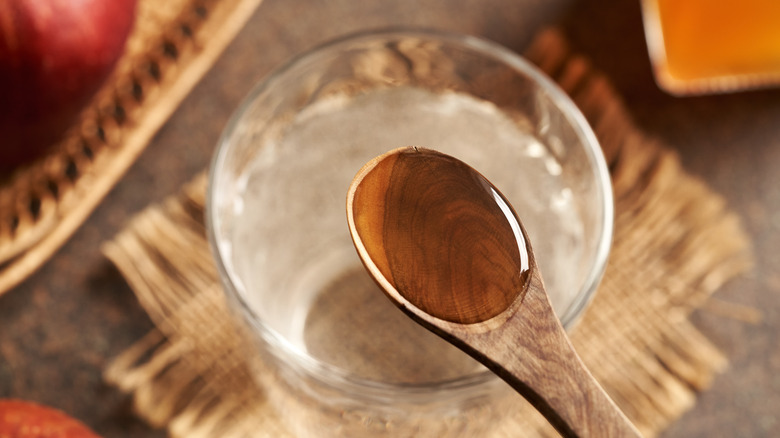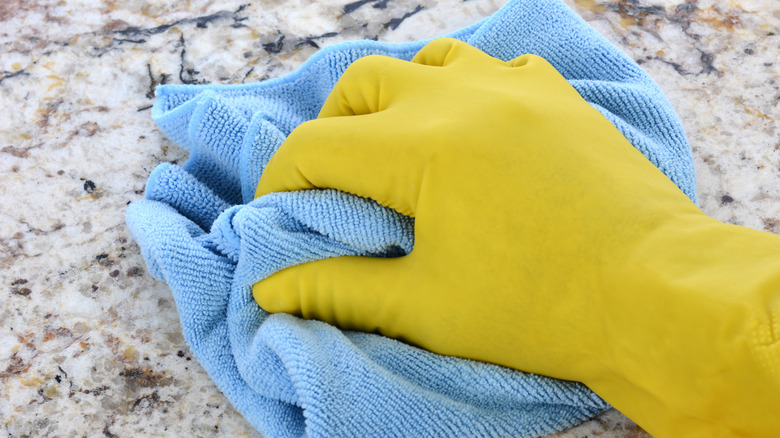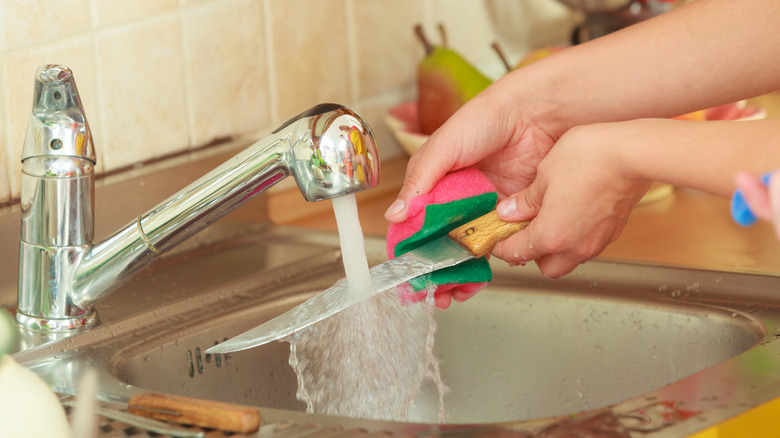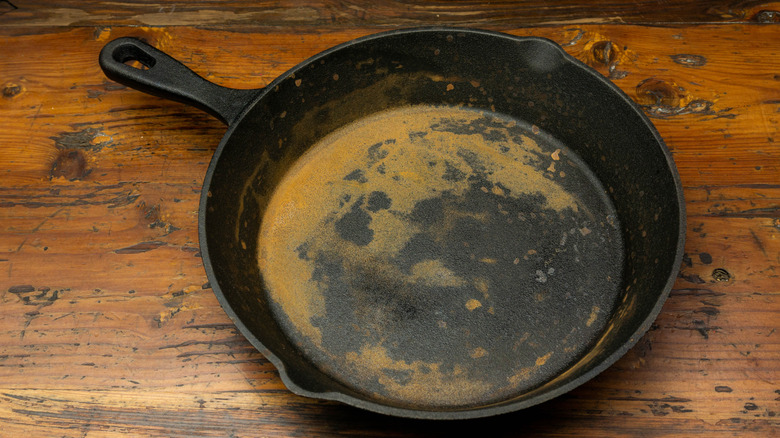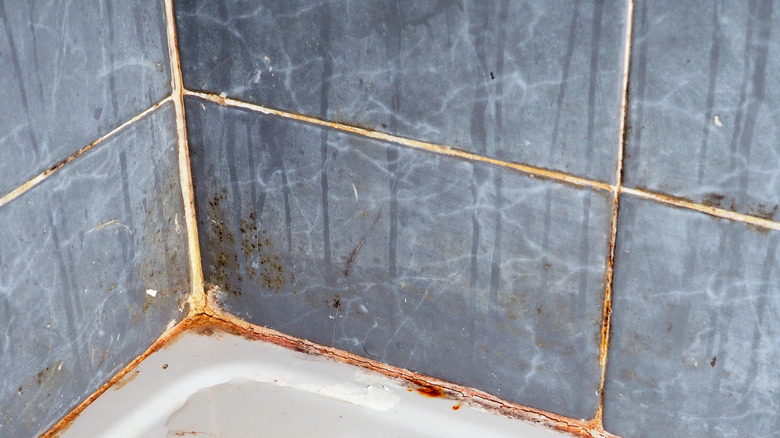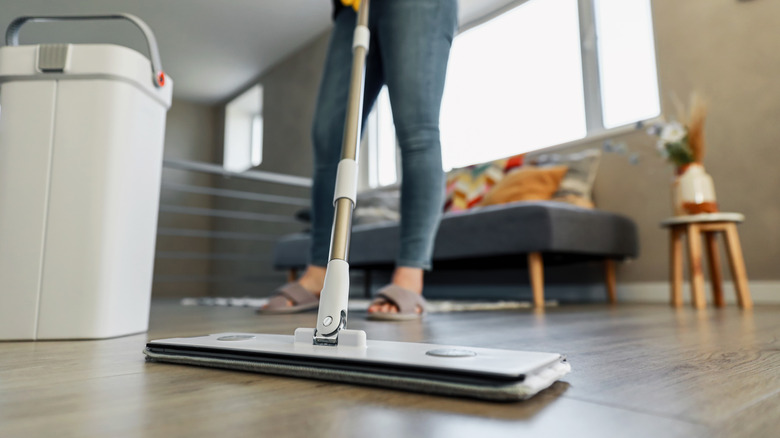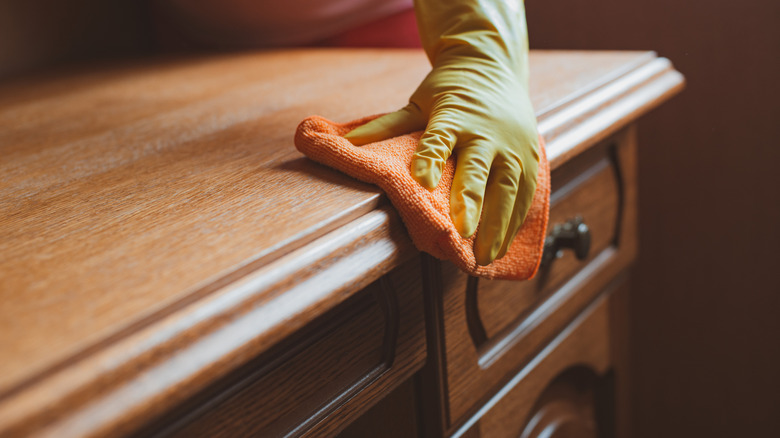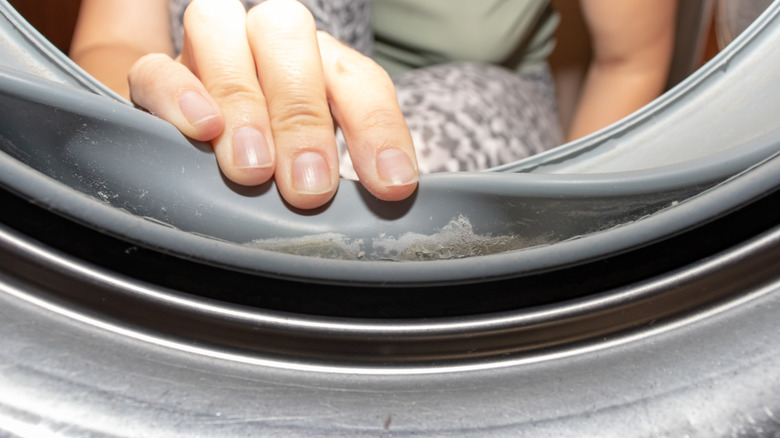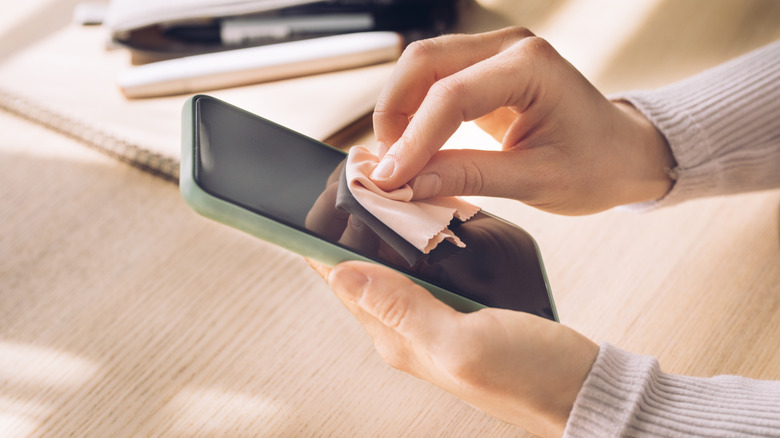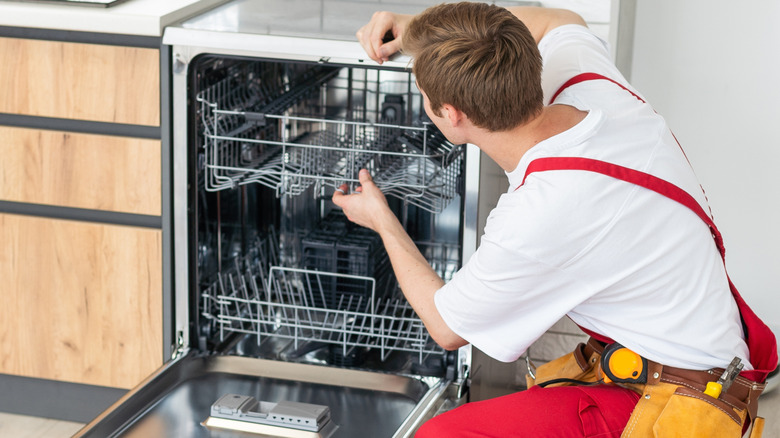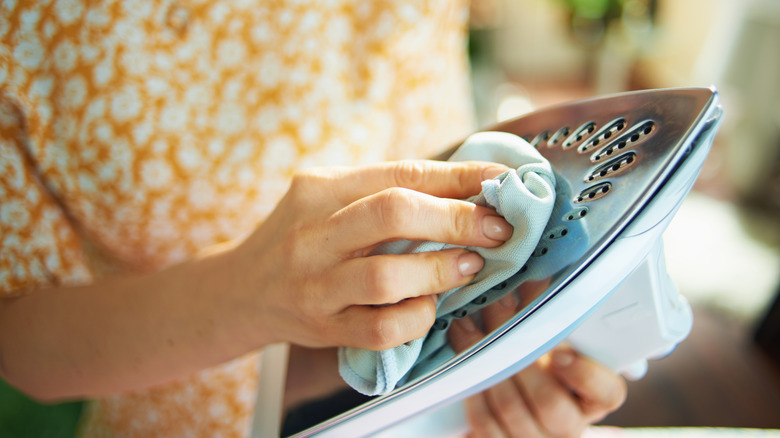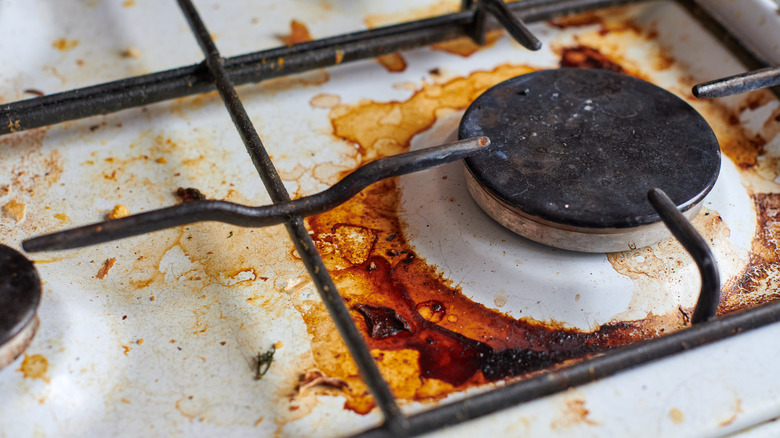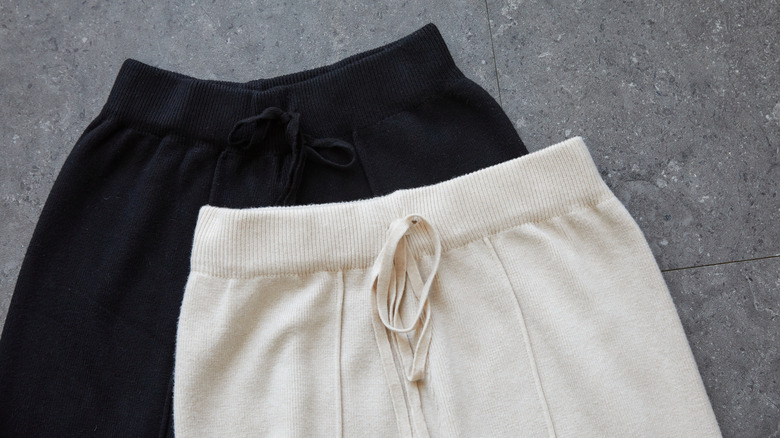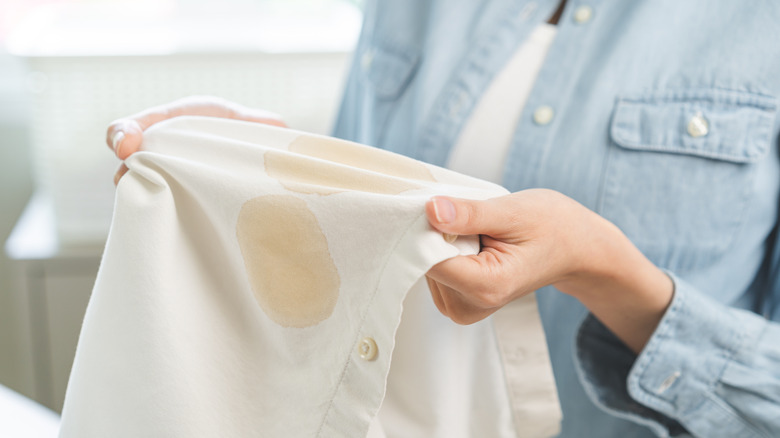14 Things You Should Probably Avoid Cleaning With Apple Cider Vinegar
There are many different ways to use apple cider vinegar for a cleaner home, like making your bathroom sink and tub sparkle, but there are some materials that can't handle this natural cleaner. Similarly to white vinegar, apple cider vinegar contains acetic acid, which is what gives it antibacterial properties and makes it an effective cleaner. Though the acetic acid can be helpful for certain cleaning jobs, it's also corrosive and can damage surfaces or materials that are sensitive to acidic cleaners. Additionally, apple cider vinegar has a dark, brown color because of the tannins it develops, which could end up leaving behind stains on certain surfaces.
Apple cider vinegar is often praised as a cleaner, because it has very similar properties to white vinegar, as both contain about 5% acetic acid. But this fruit-based vinegar has more of an apple scent, rather than a super sour smell, which can be helpful when you want a natural cleaner but not the extremely strong odor of regular vinegar. Though apple cider vinegar can kill some germs and is great for various cleaning tasks like white vinegar, it is generally the more expensive option between the two. If you decide to use apple cider vinegar, rather than white vinegar, for some basic cleaning due to the smell, it's crucial to be cautious what surfaces you're applying it to and avoid materials that can be harmed by even weak acids.
The acidity of apple cider vinegar may etch natural stone counters or floors
When disinfecting your countertops, you might consider using apple cider vinegar, because it's natural and kills bacteria — but for those with natural stone, this could be a huge mistake. Whether you're trying to mop granite floors or wipe down marble counters, acidic cleaners can damage the stone. Even when the stone is sealed, the acetic acid in apple cider vinegar is strong enough to cut through the seal and scratch your stone.
Despite apple cider vinegar being a natural cleanser, it's not suitable for natural stone and will leave it looking dull. Once your floors or counters have been etched by the acid, there's no going back and your stone will remain scratched. Rather than taking the risk with apple cider vinegar, you can protect your natural stone by cleaning it primarily with warm water and a little dish soap. If you need a deeper clean for your granite counters, try combining one part rubbing alcohol with three parts dish soap.
Your kitchen knives can become dull when cleaned with apple cider vinegar
While the concentration of acetic acid in apple cider vinegar is only around 5%, it can still be powerful, especially when you're trying to clean your kitchen knives. Acetic acid can corrode various metals, and your knives could end up suffering if you try to wash them with apple cider vinegar. As the acid in the vinegar corrodes the metal, they can become more susceptible to rust and develop pits, especially along the edge of the blade. This will cause your knives to become dull faster.
Instead of wiping down your kitchen knives with apple cider vinegar, you can keep them sharper for longer by using a more mild cleanser. Use regular dish soap and water to hand wash the knives and prevent damaging the blade. Leaving your knives to dry on a towel by themselves will also help to prevent them bumping into other dishes and getting scratched.
Apple cider vinegar can corrode your cast iron pans and aluminum pots
Just like how apple cider vinegar can damage your knives, this natural cleaner is rough on aluminum and cast iron cookware as well. When these metal pots and pans are cleaned with apple cider vinegar, the corrosive acid may cause them to change colors and begin forming pits in the metal. The oily seasoning on cast iron pans can also be eaten away, leaving your pan in danger of rusting without the protective coating.
To keep aluminum and cast iron cookware in the best shape possible, you'll want to avoid wiping it with apple cider vinegar. Instead, you can care for your cast iron pan by washing it with hot water and a scrubber that isn't abrasive. While it's normal for a little oil to remain in the pan and further season it, pieces of food that are really stuck can be removed by softening them with boiling water or scrubbing them off with a little kosher salt and water. Aluminum cookware should be washed with soap and water, or you might add a little baking soda to combat stains. The baking soda is not only abrasive, but since it's alkaline, it can help break down food build-up — especially acidic ones, like grease.
Grout may eventually fall apart when cleaned with apple cider vinegar
Some grouts that are sealed or used with ceramic tile can be cleaned with apple cider vinegar without damage; however, unsealed grout or certain types of grout can be damaged by the acidity. Though apple cider vinegar seems like a great way to remove mildew from the grout in your bathroom, it could end up doing more harm than good. Acidic cleaners like apple cider vinegar can start to eat away at grout when they're used often, making it eventually degrade and fall apart.
If your grout is holding together natural stone or if you're unsure what kind it is, you'll want to clean it with something other than apple cider vinegar. To fight tough mold and mildew, bleach can be a great alternative to acidic cleaners. Try soaking and scrubbing your grout with a diluted mix of ⅓ cup of bleach mixed with a gallon of water to get it super clean and free of mold.
Apple cider vinegar can ruin the seal on your hardwood floors
Mopping with a little apple cider vinegar might not seem like a bad idea, but there are a few reasons you should avoid cleaning your wood floors with this type of vinegar. For instance, the acidity of this natural cleanser can harm the wood of your floors and take off the wood stain. The seal on your hardwood isn't safe either, as apple cider vinegar may start to remove it as well. Without this coating and its protection, your wood floors might get scratched and will likely appear dull.
To prevent your beautiful hardwood floors from becoming discolored, scraped up, or dull, use water and a bit of soap to mop your floors instead. Combine just a couple of drops of dish soap or castile soap with 4 cups of warm water to create your hardwood floor cleaner. Mop with the soapy water and dry with a cloth to prevent water damage.
Even wax wood furniture can be harmed by apple cider vinegar
Similarly to your hardwood floors, wood furniture, including waxed wood, shouldn't be cleaned with apple cider vinegar. When exposed to the acetic acid, the wax coating on your furniture can come off and leave the wood damaged or exposed. Your wax wood furniture may become dull when it's repeatedly cleaned with this type of vinegar and the coating is slowly removed. Without the protective wax, your wood is more susceptible to damage from other sources as well — the protective layer is there for a reason!
If you're unsure of how you should really be cleaning your wood furniture, avoiding harsh acidic cleaners like apple cider vinegar is the best choice. Rather than potentially ruining the wax coating on your tables or chairs, cleaning with some water and dish soap will help to remove dirt without harming the coating. After dampening the wood with your soapy water, you'll need to dry it with a clean rag to keep the water from soaking into the wood.
Adding apple cider vinegar to your laundry could hurt your washing machine
While you may think that using a tad of apple cider in your laundry will brighten your clothes like white vinegar, it has the potential to harm components of your washing machine. The acidic cleaner may slowly degrade the rubber hoses and seals in your washing machine, and the more you use apple cider vinegar in your washer, the more damage it'll do. Eventually, the seals could wear away enough that your washing machine starts leaking, and front-loading washers might be more likely to have issues after being repeatedly exposed to the acidic cleaner.
Apple cider vinegar is sometimes also hard on stainless steel since acetic acid is corrosive, and adding it to your washer could potentially harm the drum or other metal parts. Instead, try using a commercial washing machine tablet or cleaner to get the job done right. Though using apple cider vinegar once may not hurt your washer, cleaning with it regularly is likely to do damage.
Keep apple cider vinegar away from your electronic screens
Electronics with touch screens are constantly handled and you may be searching for a way to remove smudges and kill germs. Though apple cider has great antibacterial properties, it shouldn't be used to clean the screen of your computer, tv, or phone. The acidic nature of this vinegar has the potential to make the touch screen less responsive and reduce the anti-glare function. You're also running the risk of the apple cider vinegar getting inside the device and causing harm or staining on the outside.
Though diluted vinegars are sometimes recommended for cleaning screens, it's safest to avoid it altogether. If you're concerned about your devices being covered in germs, carefully clean your phone or computer screen with a regular disinfectant wipe like Lysol. After giving the screen a quick clean, dry your electronics with a soft, clean rag.
Your dishwasher might spring a leak if you keep cleaning it with apple cider vinegar
Using apple cider vinegar for cleaning and descaling your dishwasher every once in a while is actually recommended by some appliance companies and likely won't affect your warranty, though it could do damage with time and frequent use. Just like your washing machine, dishwashers have rubber pieces that help to keep the water in, and the acidity of apple cider vinegar isn't good for them. As the rubber wears out, your dishwasher door may not seal as well as it should and you could end up with water all over your kitchen floor. Certain rubber materials may not be affected by acidic cleaners, such as natural rubber, ethylene-propylene, silicone, fluorocarbon, virgin Teflon, and butyl synthetic rubber, but if you're unsure it's probably best to avoid apple cider vinegar in your dishwasher.
Despite some dishwasher interiors being made of stainless steel, using a small amount of apple cider vinegar to scrub build-up from the metal components can be helpful; however, it's crucial not to leave the cleaner on the surface for long and to dry it with a cloth after cleaning. Otherwise, you may damage the stainless steel. It's probably fine to clean your dishwasher with apple cider vinegar sparingly, but because of its acidity, you might want to stick with a dedicated dishwasher cleaner instead.
Descaling your iron with apple cider vinegar could be a mistake
Depending on the type of iron you have, trying to remove hard water limescale from it with apple cider vinegar may not be the best choice. Though some appliance brands suggest using one part apple cider vinegar and one part water to clean the water reservoir of your iron, it's important to check your manufacturer's guide to ensure this won't cause any harm or impact your warranty. Some irons have a coating on the inside that can be worn away by acidic cleaners, or in the worst case, you might corrode the metal of your appliance.
If you don't know if apple cider vinegar is suitable for your specific iron, you'll want to use a descaling product that's designed for these appliances. Self-cleaning functions on certain steam irons could also be helpful. Because of apple cider vinegar's rich color, using it to clean your iron could cause light staining or a residue inside your iron that will have to be rinsed off with water. While this vinegar isn't guaranteed to damage every iron, you probably don't want to take the chance.
Apple cider vinegar is rough on stainless steel
A very small amount of apple cider vinegar used to quickly wipe down your stainless steel probably won't immediately etch the metal, especially if you rinse or dry it off afterwards; however, longer exposures, undiluted vinegar, and repeated use will likely hurt your appliances. Because apple cider vinegar is corrosive, it may start to gradually remove the coating that protects your stainless steel from rust. This will also cause your steel to look streaky. Once the coating has worn away, your appliances could start to develop rust, possibly resulting in irreversible damage.
For those whose stainless steel appliances have already started to develop rust, try putting a little wax over the area to keep it from progressing. Your regular dish soap and a bit of water can be used to clean the metal without leaving streaks or causing harm. If you're dealing with more difficult build-up, consider using a cleaning product formulated for stainless steel. Before cleaning your appliances, it's a good idea to check your manual to ensure the cleaners you're using are safe for your specific stainless steel.
There are better options for cleaning grease than apple cider vinegar
While apple cider vinegar can be used to clean a variety of messes and surfaces, it probably shouldn't be your number one choice for cleaning really greasy areas like your stovetop. Though the natural cleaner will cut through some grime, apple cider vinegar is better for cleaning your bathroom or fighting hard water stains because it's acidic. On the other hand, alkaline materials, or bases, are able to soak up grease by emulsifying it, making these kinds of messes easier to clean. Though it might not do any harm, depending on your range's surface, this type of vinegar isn't the best cleaner to tackle grease and the job could be made easier by avoiding acidic cleaners.
Instead, baking soda can be a great choice for eliminating oil and grease. Because it's a weak base, baking soda (or sodium bicarbonate) can help to clean up greasy stoves quickly and more efficiently than the acetic acid in your vinegar. Try making a paste with water and baking soda to scrub away all that oily residue from your range.
Sensitive and elastic fabrics can be damaged by apple cider vinegar
Both white vinegar and apple cider vinegar are touted as fantastic, natural products to add a cleansing boost when washing your clothes. Though acetic acid may be able to help soften your fabrics by removing grime and build-up, as well as eliminate strong odors, it's not suitable for more delicate fabrics or pieces that contain elastic bands. The acidity of apple cider vinegar wears out the elastic and shortens the life of your clothing, and this can especially be seen with stretchy fabrics used for athletic wear. With fabrics that require more gentle care, this acidic cleaner may bleach the colors or damage the material.
Apple cider vinegar puts your elastic bands, stretchy clothes, and fabrics like silk in jeopardy, and avoiding it in these instances is the safest bet. If you need a way to get bad smells out of your fabrics, and washing them in your regular laundry detergent isn't enough, pre-treating and soaking your fabrics in baking soda and cold water will help to deodorize your clothes before washing. Since baking soda is capable of neutralizing odors of both acidic and basic origins, it'll do the trick without exposing your elastic fabrics to acid.
The tannins in apple cider vinegar could stain lighter colored fabrics
The darker brown color of apple cider vinegar is due to tannins. While white vinegar is often recommended as a stain remover and to brighten white clothes, the deeper hue of the apple cider variety can actually leave stains on the fabrics you're trying to treat. Materials with light colors or that are more delicate may become discolored or have brown stains where the apple cider vinegar was applied. Diluting this acidic cleaner could potentially help to avoid discoloration, but it might not even be worth the possibility of further staining your fabrics.
Apple cider vinegar is less likely to stain darker colored materials, though this still carries some risk, as the acidic cleaner can sometimes cause bleaching as well. Essentially, it needs to be properly diluted. To treat appropriate clothing, make a solution of one part apple cider vinegar and two parts water. Alternatively, if you know your materials can handle an acidic product like vinegar, just use white distilled vinegar instead to avoid any potential staining and get the same benefits.
